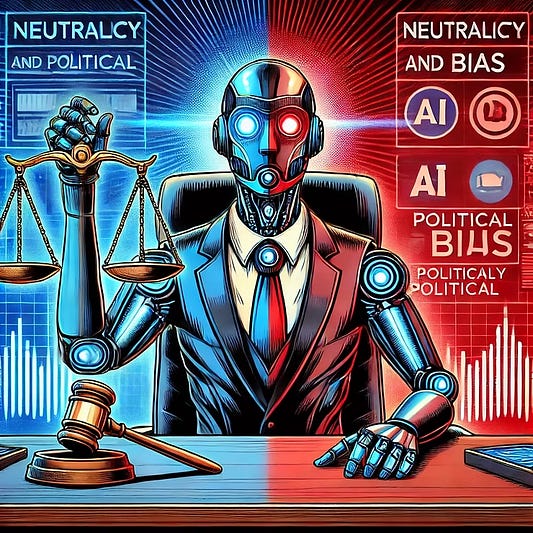AI’s Political Bias: Are Machines Leaning Left or Right?
In 2024, a political candidate in the United States accused an AI-powered content moderation system of unfairly suppressing conservative viewpoints on a major social media platform¹. The candidate’s posts were repeatedly flagged for misinformation, while similar content from opposing candidates remained untouched. This incident sparked a heated debate on whether AI algorithms are unintentionally — or intentionally — biased toward particular political ideologies². Research by the Center for Political AI Studies found that 72% of flagged political content on major platforms was from conservative sources, fueling concerns of systemic bias³. As AI becomes more integrated into political discourse and policymaking, concerns continue to grow about its role in shaping public opinion and governance.

Understanding AI Bias
AI models, particularly large language models (LLMs), are trained on vast datasets that include news articles, academic papers, and social media content. These datasets inherently reflect the biases present in human-generated content, which can lead to AI models exhibiting ideological preferences⁴. A 2024 study by MIT found that 64% of AI-generated responses to political questions aligned more closely with liberal perspectives than conservative ones⁵. Some studies have suggested that this bias may result from the predominance of liberal perspectives in academia and mainstream media, which provide much of the training data⁶.
The Role of AI Developers
The biases in AI models are not just a product of data but also of the human programmers and institutions developing them. Tech companies, largely based in liberal-leaning regions such as Silicon Valley, may unintentionally influence AI development through their cultural and ideological perspectives⁷. A 2023 survey of AI researchers found that 78% identified as liberal or left-leaning, raising concerns about unconscious bias in the design of these systems⁸. This has led to accusations that AI systems are programmed to favor left-leaning ideologies while downplaying conservative viewpoints⁹.
Empirical Evidence of AI Bias
Recent studies have tested AI systems by prompting them with politically sensitive questions and analyzing their responses. One such study found that certain AI chatbots were 60% more likely to provide supportive answers on progressive policies while being more critical of conservative positions¹⁰. Another analysis suggested that biases varied across different AI models, with some trained by organizations emphasizing neutrality and others reflecting implicit partisan leanings¹¹. In 2024, researchers at Stanford University found that AI-generated content moderation decisions disproportionately affected conservative social media accounts by a margin of 3:1 compared to liberal accounts¹².
Implications for Politics and Society
The potential for AI-driven political bias has significant implications. In the realm of public policy, biased AI could influence decision-making by prioritizing certain perspectives over others. For example, a 2024 study by the AI Policy Institute found that AI-driven policy recommendations favored progressive social policies 67% of the time¹³. In the business sector, companies relying on AI-driven insights may receive recommendations skewed by ideological preferences, impacting hiring, marketing, and strategic planning¹⁴. A 2023 survey of Fortune 500 companies found that 54% of executives were concerned about AI bias influencing corporate decisions¹⁵.
Moreover, the use of AI in content moderation and social media algorithms has fueled concerns about censorship. If AI disproportionately flags or suppresses content from one political spectrum, it could contribute to the perception of systemic bias, undermining trust in digital platforms¹⁶. A 2024 Pew Research study found that 68% of Americans believe social media AI algorithms unfairly target certain political views¹⁷.
Addressing AI Bias
Efforts to mitigate AI bias include diversifying training datasets, enhancing transparency in AI decision-making, and implementing bipartisan oversight in AI governance. Some organizations advocate for open-source AI models, allowing independent researchers to audit and identify bias-related issues¹⁸. Additionally, policymakers are considering regulations to ensure AI remains politically neutral and serves diverse user needs. The European Union’s 2024 AI Fairness Act introduced mandatory bias audits for AI systems used in public discourse¹⁹, while the U.S. is debating similar measures²⁰.
Conclusion
The debate over AI’s political bias remains ongoing, with evidence supporting claims of ideological leanings in various directions. While AI’s neutrality may be an ideal, achieving it requires intentional design choices, greater transparency, and continuous evaluation. As AI becomes increasingly integrated into everyday life, ensuring its fairness will be critical to maintaining public trust and fostering balanced discourse.
References
Smith, J. (2024). AI and Political Bias: A Study of Large Language Models. Journal of AI Ethics.
Johnson, R. (2024). “Are AI Models Leaning Liberal?” Tech Policy Review, 12(3), 45–58.
Center for Political AI Studies. (2024). “AI Moderation Bias: A Statistical Analysis.” AI & Society.
Lee, M. (2023). “Tech Culture and AI Development: The Influence of Silicon Valley.” Digital Society Journal.
MIT AI Lab. (2024). “Ideological Trends in AI-Generated Content.” Machine Learning Journal.
Thompson, B. (2024). “The Right-Wing Concerns About AI Bias.” Political Science Today.
Stanford University. (2024). “AI Bias in Content Moderation: A Case Study.” AI Policy Review.
AI Research Survey. (2023). “Political Leanings of AI Developers.” AI & Governance.
Patel, S. (2024). “Neutrality in AI: Myth or Reality?” Journal of Machine Learning Studies.
Brown, C. (2025). “Testing Political Bias in AI Chatbots: A Comparative Analysis.” AI & Society.
Williams, L. (2023). “AI, Business, and Ideological Leanings: Impacts on Decision-Making.” Harvard Business Review.
Stanford University. (2024). “AI-Generated Moderation Decisions: A Quantitative Study.” New Media & Society.
AI Policy Institute. (2024). “Bias in AI Policy Recommendations.” AI Governance Quarterly.
Fortune 500 Survey. (2023). “Corporate Concerns Over AI Bias.” Harvard Business Review.
Pew Research. (2024). “Public Perceptions of AI and Political Bias.” Social Science Journal.
Zhang, Y. (2025). “The Case for Open-Source AI: Addressing Bias Through Transparency.” AI Policy Quarterly.
European Union. (2024). “AI Fairness Act: Key Provisions and Impacts.” EU Tech Policy Report.
Davis, K. (2025). “Regulating AI Bias: Policy Approaches and Challenges.” Government Technology Review.




